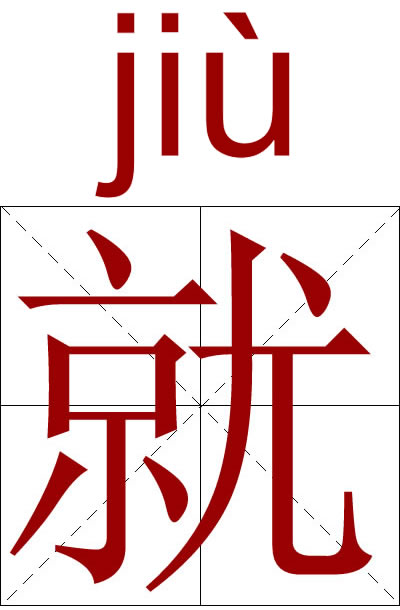When 就 jiù precedes a verb phrase that is not linked to another verb phrase,it conveys the meaning of uniqueness.

In some sentences,this meaning is best translated by the English word 'only':
wǒ jiù yí kuài qián 。
我 就 一 块 钱 。
I only have one dollar.
In some contexts,就 jiù conveys precise identification of a noun phrase.If the noun phrase is a person or place,there may be no English equivalent for 就 jiù.
wánɡ : nǐ zhǎo shuí ?
王 : 你 找 谁 ?
wánɡ :Who are you looking for?
lín : wǒ zhǎo wánɡ měi línɡ 。
林 : 我 找 王 美 玲 。
lín : I am looking fro Wang Meiling.
wánɡ : wǒ jiù shì 。
王 : 我 就 是 。
wánɡ : That's me.
If the noun phrase is a pecifier or a directional expression,就 jiù may be translated 'right' or 'precisely'.
Q : zhào jīnɡ lǐ de bàn ɡōnɡ shì zài nǎ ér ?
Q : 赵 经 理 的 办 公 室 在 哪 儿 ?
Where is Manager Zhao's office?
A : tā de bàn ɡōnɡ shì jiù zài zhè ér 。
A : 她 的 办 公 室 就 在 这 儿 。
Her office is right here.
bàn ɡōnɡ shì
办 公 室
n.office
Q : tú shū ɡuǎn zài nǎ ér ?
Q : 图 书 馆 在 哪 儿 ?
Where is the library?
A : jiù zài huǒ chē zhàn duì miàn
A : 就 在 火 车 站 对 面
Right across from the train station.
tú shū ɡuǎn
图 书 馆
n. library
huǒ chē zhàn
火 车 站
n. train station
就 jiù is also used to link two verb phrase and to signal a relationship of sequence between them.
wǒ kàn le bào zhǐ yǐ hòu jiù shuì jiào 。
我 看 了 报 纸 以 后 就 睡 觉 。
After I read the newspaper I will go to sleep.
tā hěn cōnɡ mínɡ , yì xué jiù huì 。
她 很 聪 明 , 一 学 就 会 。
She is really smart,As sson as she studies it she gets it.
就 jiù usually precedes negation,but it may also follow negation.
zhè jiàn shì qínɡ bú jiù shì wǒ yí ɡè rén zhī dào 。
这 件 事 情 不 就 是 我 一 个 人 知 道 。
(As for) this matter,it is not just I who knows.
The adverb 就 (jiù) is used before a verb to suggest the earliness, briefness, or quickness of the action.
lì rú :
例 如 :
For instance:
1.他明天七点就得上课。
1.Tā míngtiān qī diǎn jiù děi shàng kè.
1.He has to go to class [as early as] at 7:00am tomorrow.
2.我们八点看电影, 他七点半就来了。
2.Wǒmen bā diǎn kàn diànyǐng, tā qī diǎn bàn jiù lái le.
2.We [were supposed to] see the movie at 8:00, but he came [as early as] 7:30.
就 (jiù) and 才 (cái)
The adverb 就 (jiù) suggests the earliness or promptness of an action in the speaker’s judgment.
The adverb 才 (cái) is the opposite.
It suggests the tardiness or lateness of an action as perceived by the speaker.
A1: 八点上课,小白七点就来了。
A1: Bā diǎn shàng kè, Xiǎo Bái qī diǎn jiù lái le.
A1: Class started at 8:00, but Little Bai came [as early as] 7:00.
B1: 八点上课,小张八点半才来。
B1: Bā diǎn shàng kè, Xiǎo Zhāng bā diǎn bàn cái lái.
B1: Class started at 8:00, but Little Zhang didn’t come until 8:30.
A2: 我昨天五点就回家了。
A2:Wǒ zuótiān wǔ diǎn jiù huí jiā le.
A2:Yesterday I went home when it was only 5:00.
(The speaker thought 5:00 was early.)
B2: 我昨天五点才回家。
B2:Wǒ zuótiān wǔ diǎn cái huí jiā.
B2:Yesterday I didn’t go home until 5:00.
(The speaker thought 5:00 was late.)
When commenting on a past action, 就 (jiù) is always used with 了 (le) to indicate promptness, but 才 (cái) is never used with 了.
Keywords: Learn Chinese Grammar, Learn Chinese Measure word,online Chinese classes,Learn Chinese via Skype(ID:MandarinChineseSchool),1 on 1 Chinese lesson,Chinese tutor,learn standard Chinese,xue hanyu,xue zhongwen,best textbook for learning Chinese,dialogues in Chinese,Chinese conversation,reading,writting,Chinese listening comprehension

